[ad_1]
Thaenthinai
A shopper browses through a rack in which rice and millets are stacked in neat rows; a cooker whistle goes off in the kitchen at the back, while diners start walking in to seat themselves at the short tables for a millet-heavy meal. There is a lot happening towards lunch time at Nattrinai Thaenthinai at Kurumbapalayam, an organic store with a restaurant inside its premises. Nattrinai, started by three partners eleven years ago, now has two branches in the city. The store sources organic produce from marginal farmers in Tamil Nadu and Andhra Pradesh. “Four years ago, we decided to open our own restaurant inside our shop,” says T Senthil Kumar, one of the founders, who is also a farmer.
The idea, according to him, is to offer simple, millet and heritage-rice based meals that are healthy, as well as drive home the concept of going back to our roots. “We came up with the combo meal idea after a lot of trial and error,” explains Senthil, as our lunch thaali arrives. “Initially, we did suffer setbacks since people were not used to consuming millets in the place of rice,” he adds.
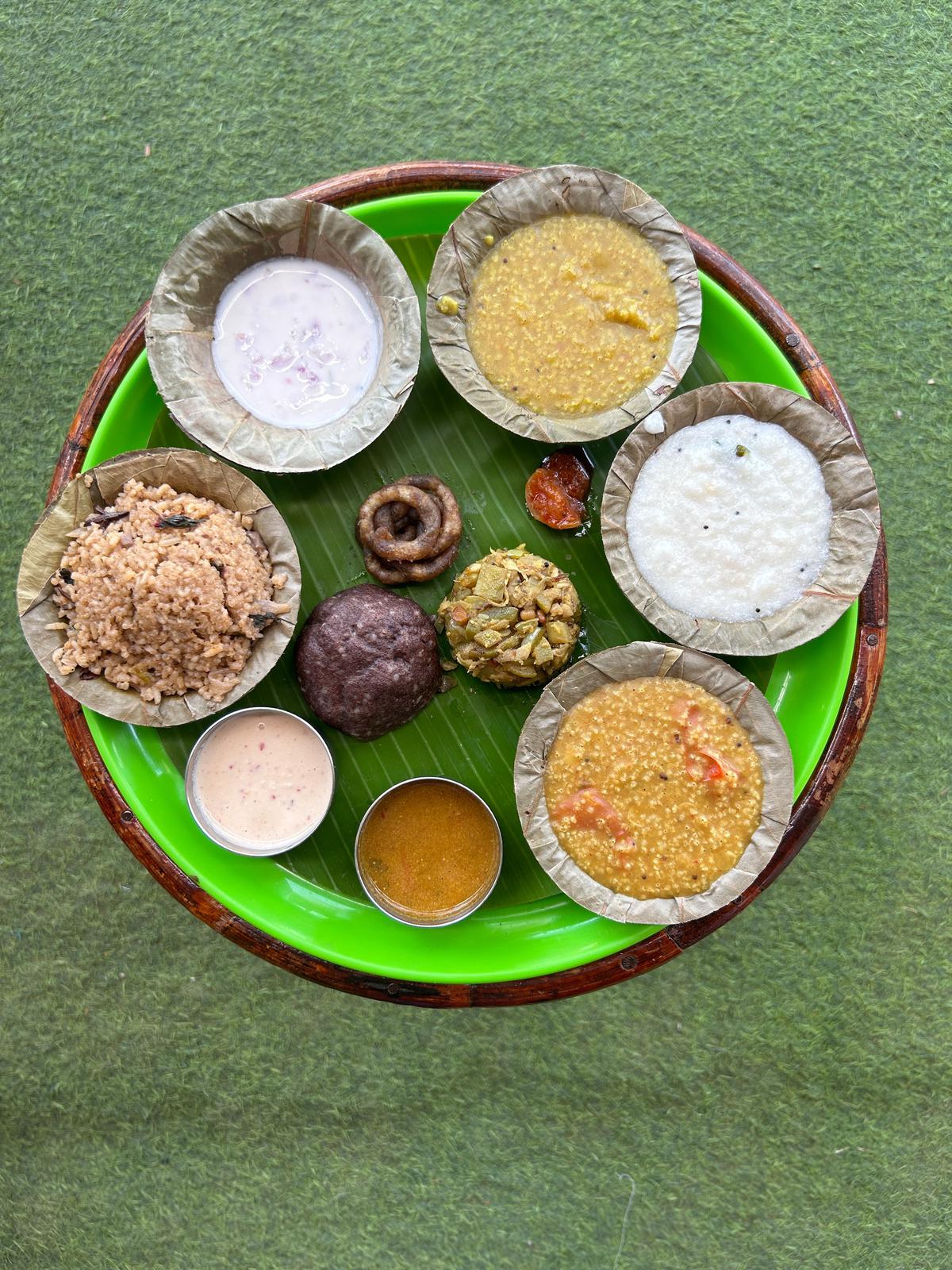
The lunch thaali at Thaenthinai
| Photo Credit:
Special arrangement
Their solution: mushroom biryani made with heritage rice such as iluppai poo samba, Sivan samba and seeraga samba. “We realised we had to offer rice in some form,” he points out, adding that this worked to their favour. On our plate that day is ragi kali with tomato curry and peanut chutney, mushroom biryani made of fragrant iluppai poo samba, kuthiraivaali sambar and rasam rice, arasanikkai poriyal, thooyamalli curd rice, a crispy paruppu vadai, and laddoo for dessert. The starter is a pepper-heavy soup made of mudavattukal, a tuber sourced from Kolli hills, said to have medicinal properties.
The meal is mild and balanced, with the mushroom biryani being the highlight. “People are not used to mixing millets with sambar and rasam like they do with rice, which is why we chose to offer them in the present form,” explains Senthil, adding that people are warming up to their offering, especially over the past six months.
“We did have the fear of failure in our initial months,” Senthil says. “For instance, it is easier to stop at a bakery for an egg puff than look for a place that serves a healthy alternative made of organic ingredients.” They also had to price their meals competitively, despite using premium ingredients.
Thaenthinai also has a range of sweets and savouries. “We make them in small batches at our farm,” Senthil explains, as we try their sticky wheat halwa sweetened with country sugar. The dessert comes in cute areca leaf cups and can be had on the go. But their nattu sakkarai ragi brownies win us over more than anything. The brownies are the perfect balance of the nutty flavour of the country sugar and the slightly bitter dark chocolate.
The restaurant is open for breakfast (8am to 10am), lunch (noon to 3pm), evening snacks and dinner (6pm to 9pm). A meal for two costs approximately ₹300. It is located at Sai granites building, Sathy Road, opp. Kumaran hospital, Kurumbapalayam SS Kulam and 95/E, Sathy Main Road, Saravanampatti. For details, call 9842244133.
Ainthinai Attil
The taste of home: this is what the ulundhu kanji at Ainthinai Attil reminds one of. The newly-opened restaurant, that can seat 30 people, is inside the premises of Iyal organic store at Sowripalayam. Here, the focus is on using locally-sourced ingredients. The menu, hence, changes every day, according to the availability of vegetables. “We chiefly source vegetables from organic farmers in the Kongu belt,” says N Karthikkeyan, one of the founders. “This includes places such as Palladam, Dharapuram, Ooty, and Annur.”
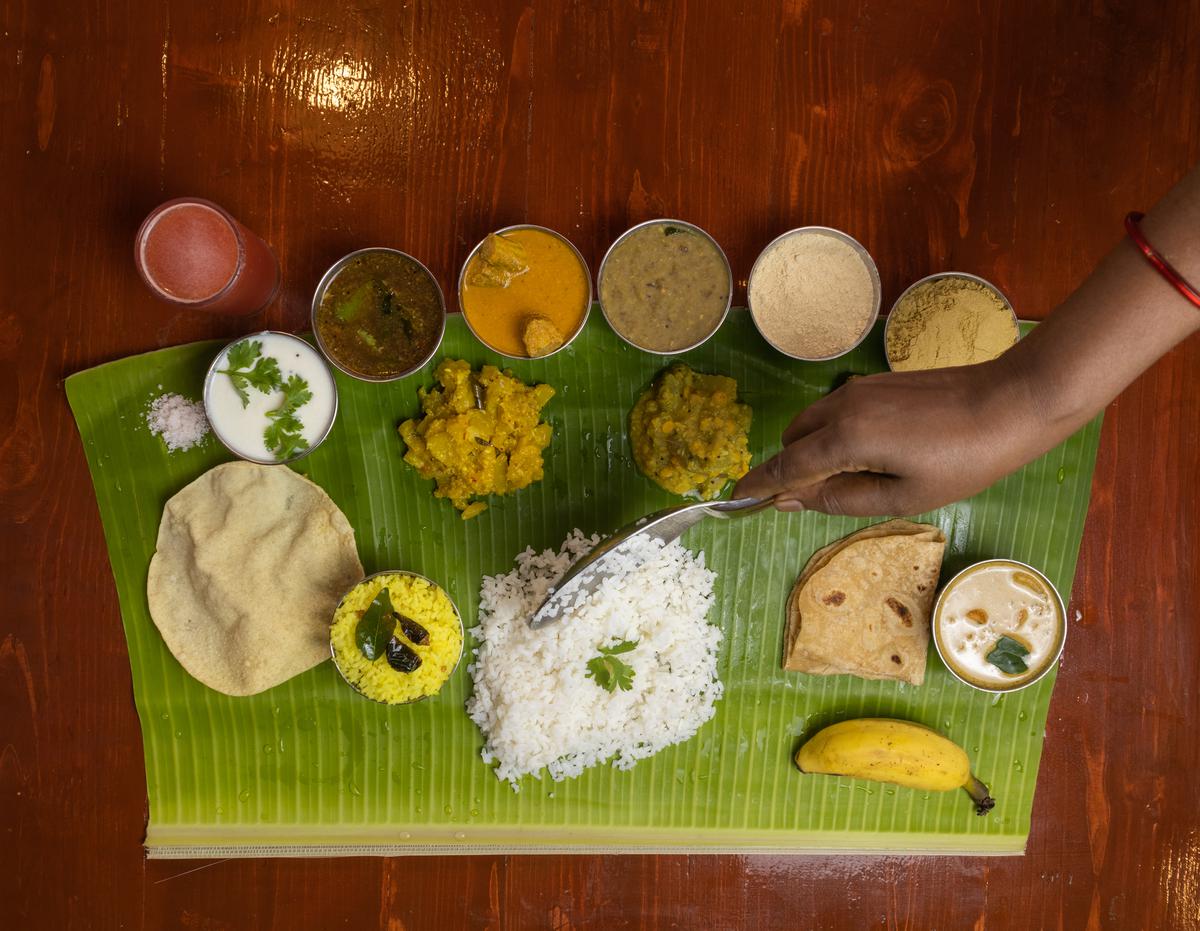
The lunch platter at Ainthinai Attil
| Photo Credit:
Special arrangement
The restaurant is a natural progression of value addition to their organic vegetables, fruits, and pulses, Karthikkeyan points out. The idea, according to him, is to make best use of what their farmers send them. “We get fresh vegetables and greens on Tuesdays and Fridays, and hence, offer dishes such as keerai poriyal on those days,” he says.
We try their hot ragi pakodas, crispy of thin onion slivers: they go well with hot sukku coffee, their evening snack staple. There are also thattu vadai sets and norukkal, that can be washed down with sweet coconut milk or freshly-squeezed sugarcane juice. The spring rolls deserve special mention: the outer wrap is made of wheat instead of maida. They come stuffed with thin slices of capsicum, onions, and carrots; we polish them off in minutes and order another plate.
Lunch, at Ainthinai Attil, consists of rice (usually thooyamalli heritage rice variety), two kuzhambu variations such as pachaipayaru kuzhambu, peerkangai masala curry and kollu paruppu; a kootu, poriyal, thuvayal, juice, a serving of variety rice such as lemon or carrot rice, chapati and kurma. Dinner and breakfast are simple affairs with idli, dosai and idiyappam made of heritage rice, sevai, chapati and poori.
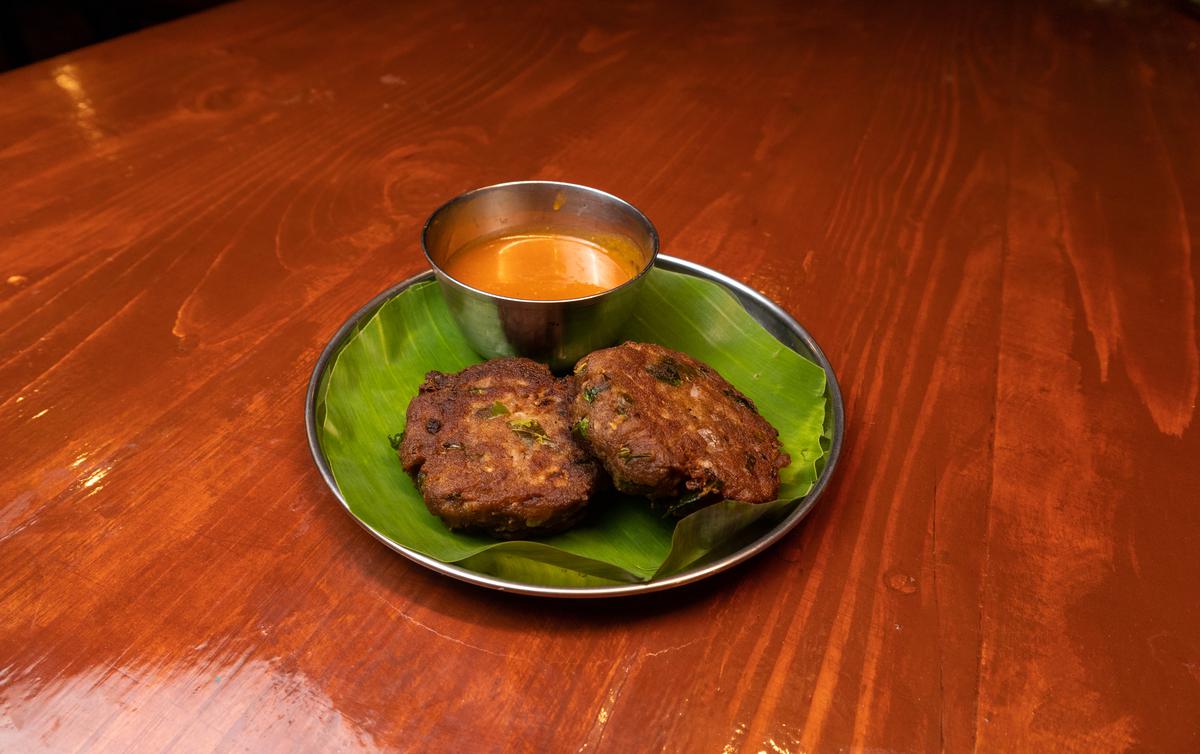
Yam cutlets
| Photo Credit:
Special arrangement
Their evening snacks, points out M Parthiban, one of the founders, are among their highlights. Their all-women team whips up a range of dishes such as sweet ragi kozhukattais, spring rolls, cutlets, momos, vadais and bondas. Karthikkeyan says that it is women who run the show at their restaurant, right from cooking, waiting tables, and billing. “We have a team of nine that handles everything,” he explains, “Our only briefing to them was to cook like they would at home for their family.”
Karthikkeyan says since all their ingredients are organic — they also use chekku oil and milk from native cows — it is a challenge to keep prices low. But they have priced their meals competitively — lunch costs ₹130 a meal. “The trick is to offer quality, so that we attract repeat customers and are able to increase our production volume,” he says. “Once people taste our spring rolls, for instance, they will prefer them over the frozen ones that are served at most fast-food outlets.”
They prefer grinding their batter fresh to avoid refrigeration and reuse of over-fermentation. Karthikkeyan says they are sticklers when it comes to ingredients, and ensure spice levels are not too high, keeping in mind children and the elderly. “We also offer subscription-based lunch take-aways, that we supply to people in apartments in our neighbourhood,” he adds.
Apart from the food, an interesting aspect about the restaurant’s décor is the flooring: it is covered entirely with smooth pebbles, giving one the feeling of walking by a river.
Ainthinai Attil is open for breakfast (7am to 9am), lunch (12.30pm to 3.30pm), snacks (4.30pm to 6.30pm) and dinner (7pm to 9pm). It is located at New no: 45, Rajiv Gandhi nagar, 80 feet road, Sowripalayam. A meal for two costs approximately ₹300. For details, call 9865290870.
Bio Basics
A gleaming steel dabba along with a plantain leaf pothi and the promise of a hearty Kerala lunch awaits. As I unbox, familiar aromas of Kerala matta (red rice) and pumpkin erissery fill my senses. What follows is a hearty lunch of red rice with mixed vegetables sambar, flavourful potato masala curry garnished with hand-pound garam masala, and a satisfying coconut chammandi just like what is made back home. Dessert is the buttery pudding, Kerala katti payasam made with Uma red rice, jaggery and organic ghee that comes ensconced in the plantain leaf.
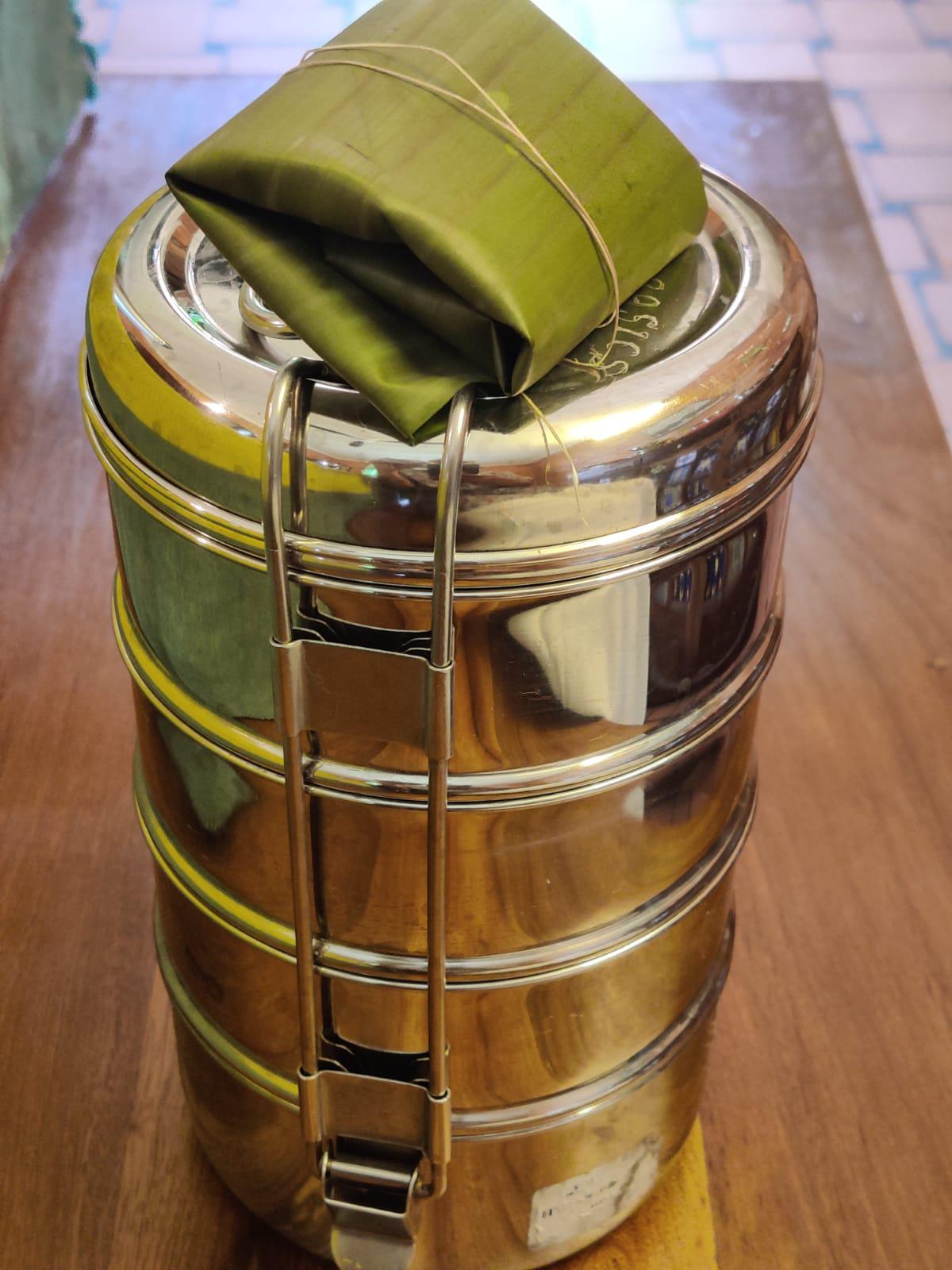
The meal comes packed in a gleaming steel dabba along with a plantain leaf pothi
| Photo Credit:
Special arrangement
The Kerala lunch, home-delivered on weekends by Bio Basics, an organic online retail store passionate about bringing diverse grains to families, is a peek into understanding a sustainable way of life that starts with eating organic meals. Says Sreedevi Lakshmi Kutty, co-founder, “We are curating 60 different traditional varieties of rice and 10 kinds of wheat. Kerala rice alone, we have seven different kinds like thondi, kuruva sourced from Wayanad, Palakkad, and Kozhikode. We also have aromatic kandagasaalai, mullan kaima and jeerakasala rices from Wayanad. We started sample lunches to friends and customers with Kerala dishes I am familiar with.”
For the Kerala experience, she combines sambar and avial or adds an olan, erissery or kichicdi. “All the ingredients are available to order on Bio Basics. We also want to showcase that Kerala meals can be wholesome and tasty. We source hand-pounded garam masala in small batches, may be three to four kilos at a time from Gujarat that goes well with kootukari we have with the sadya,” explains Devi. When the raw mangoes arrive in summer, she uses pacha (raw) manga in avial and chammandi while the ripe ones go into mango pachadi for every weekend meal.“It’s an effort to help people value quality ingredients. We have introduced features like rice selector on our website to help people choose. We pack the food in sustainable dabbas and take the effort of collecting it back by our in-house delivery team.”
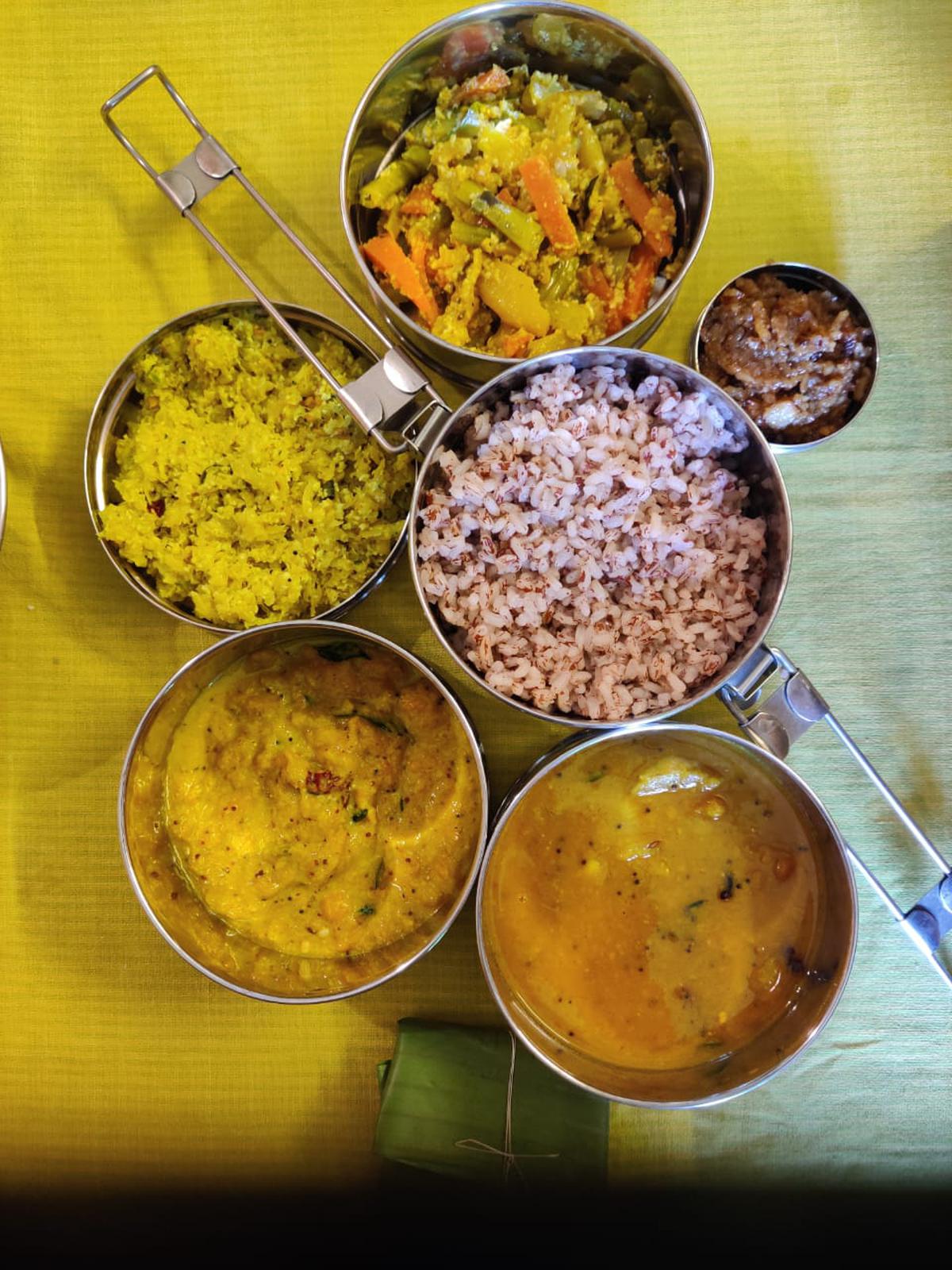
The Kerala lunch, home-delivered on weekends by Bio Basics
| Photo Credit:
Special arrangement
Looking back at her eight-year-old journey, she recounts, people are aware, but often there is a kind of lapsing and it takes some time to get the momentum back. “We have to also encourage farmers and not keep jumping from one fad to another leaving them in dismay. Our parents and grandparents eat seasonal, local food. Why can’t we do the same?”
The lunch is priced at ₹350 plus GST. Available only for Bio Basics customers in the city. Call or WhatsApp 9790516500 for details. Pre-booking closes on Thursday.
[ad_2]





